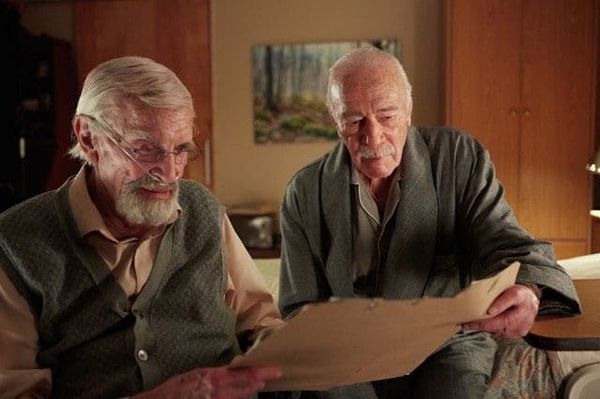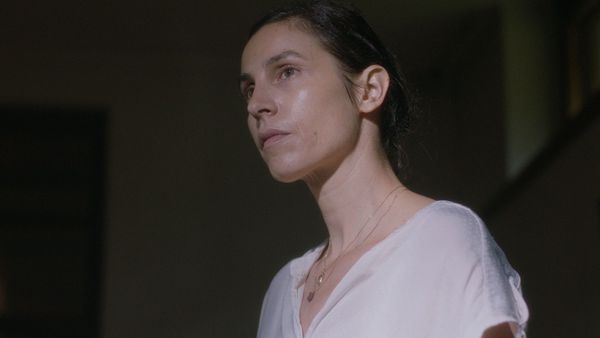 |
| Gabi (Dovile Kundrotaite in Remember To Blink). Kundrotaite: 'You cannot direct the children, the children direct you' Photo: Courtesy of POFF |
French star Azoulay - who can currently be seen in the UK in Black Box, which is playing as part of the French Film Festival - says that not speaking Lithuanian helped her with the role.
“It was a challenge,” she says. “The children are the link between the two languages and it was good not knowing the language of the other to play the situation.
Kundrotaite adds: “For me, it was also very exciting, because I had to learn French for the movie, so it was also an experience just to learn the language. I really enjoyed it, but it was very difficult.”
The young Lithuanian star, who is likely to find herself more well known as a result of working on this film says that she learned French for a year for the role. She had previously learned it in school but only for a year, adding: “I knew the alphabet. I knew the sounds and that’s it, I didn't know anything else.”
Kundrotaite says not being completely fluent was useful when it came to establishing her character, who we also see sometimes struggling to find the exact word in conversation.
She explains: “I'm very glad Austeja decided to let me be clueless and just not pretend to be fluent in French, because that would be really, really difficult. It was already difficult. It's one thing when you read the script with a teacher or with Austeja, and then when the actors come in, and they speak the language so perfectly, that was very difficult.”
Azoulay adds: “I never learned any words in Lithuanian. So it was really my character’s situation, “Okay. It's my children, but I don't understand them”. So the link is Gabi.”
That’s one of the things that’s so interesting about the psychology underpinning the film, that Jacqueline’s character is heavily dependent on Gabi at the same time as coming to hate the situation she finds herself in.
 |
| Anne Azoulay in Remember To Blink. Azoulay: 'We have to deal with the fear and with the truth of the children. We have to be at the same level' Photo: Courtesy of POFF |
A lot of the emotion in the film also comes from the adult performances bouncing off those of the children.
Kundrotaite says: "The children were six or seven years old, so preschool, and they could only shoot for four hours a day. You cannot direct the children, the children direct you. I remember when you see a scene and you talk with the director, and you know where it should go and you do it at the rehearsals, everything is fine. But when the shooting comes, something happens, just like with adult actors, but with the small act actors that's even more emphasised. You see that it's going off script and you have this dilemma. Should I go with the children and just forget the script and be in the moment? Or should I try to get them back? I was struggling with that dilemma because you're, you're trying to maintain your role at the same time. With the children, It's especially difficult because sometimes they might not give you the acting “truth”, but then you still need to compose yourself and do yours. So it was quite difficult. They surprise you every moment that it’s possible.”
For the character of Jaqueline the interplay with the children is arguably even more difficult, since their new mother is basically the disciplanarian in the home and many of ther scenes with the younger stars required high emotion.
“It's very difficult,” she says “In fact, it was a challenge with those children because they're incredible. The challenge was to find the same “truth” that they were. The link was so strong between us, that even if I prepared the girl, saying, ‘Okay, I'm going to shout now she was like that’ [she mimics a child looking scared]
“It was painful and it was complicated to “hurt” her. I have to do it, but not against her.. That's why Austeja is very good in the direction because we can make the difference between acting and living. And it was difficult for the little boy too, because during the night, he was very stressed.There is a scene where he's sleeping, and I was on him and he was very stressed. The situation was very simple. But for him, it was very complicated. So we have to deal with the fear and with the truth of the children. We have to be at the same level.”
Kundrotaite adds: “What's so amazing that the experience was just so it was so deep. Austeja is such a great director, because she's so sensitive. Everything she does, all of the metaphors, all of the phrases, everything is so well thought out. I felt very comfortable and to have it as an international debut - I feel very honoured.”
Given how slippery the characters are, I wondered if the actors found their opinions also changed at all during the shoot.
Azoulay says: “It's not as simple as we imagine it is. We have to live with the contradictions, the fears and the discoveries. It's not white. It's not grey, it’s not black, it's purple, it’s black, black black, it’s shining. I think the strength of the film is that it's not as simple as you imagine.”
Kundrotaite adds: “I really felt Anne’s support, she was a wonderful actress to work with. When we were doing the casting in France, I came together with Austeja. And we had many, many French actresses. And there were some actresses that were very good. But there was no connection. They left me out. They were just being the star of the show. Yeah. So I really appreciate what you did.”
Azoulay adds: “It's the complexity of the characters and the way each is together and alone. At the end, each becomes stronger, and maybe a new person.”
Read our interview with director Austeja Urbaite





















